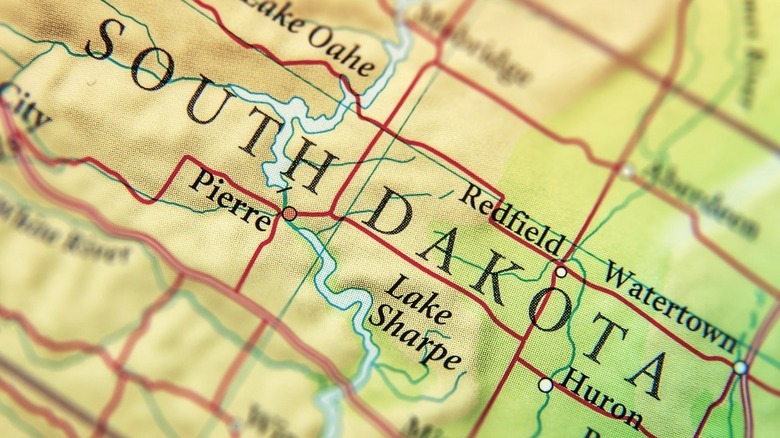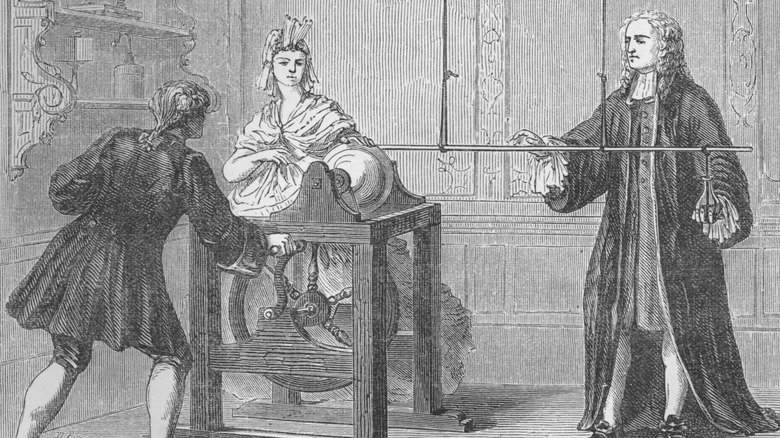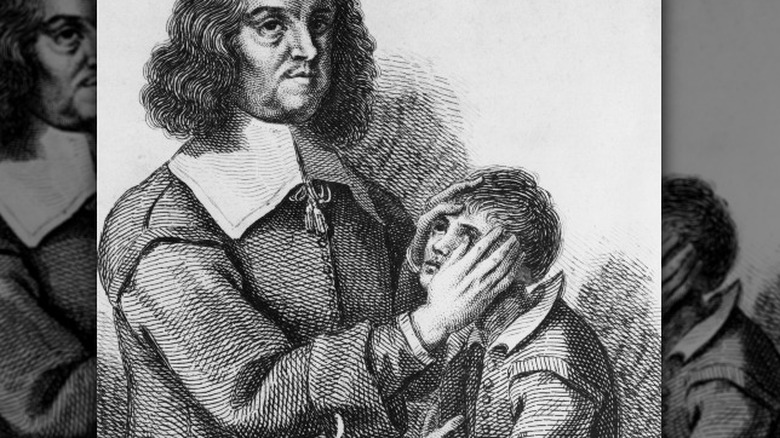Weirdest Laws In South Dakota
The state of South Dakota has 66 counties, most of which are relatively small. Like all states, South Dakota is governed by federal law, state law, and county law (in descending order of authority), and each state has its own laws that are unique to the history that shaped them. Each county, also, has its own codes of ordinances that apply at the regional level which reflect both their history as a region and the specific issues of precedence in their town.
One might wonder which incidents, individuals, or backstories are responsible for the more unusual laws of some states, and South Dakota is no exception. From skinny dipping in Redfield to creating static in Huron County (between the hours of 7 a.m. and 11 p.m., that is), some specific acts, objects, or institutions are explicitly banned in South Dakota according to some of its more unique (or at least overtly specific) ordinances. If you're visiting the state of South Dakota — or if you live there — make sure to follow these laws.
Banned: Eavesdropping
In the South Dakota Code of Ordinances, eavesdropping is strictly prohibited. In addition to laws regarding surveillance, it's a class one misdemeanor to "eavesdrop" on someone without their consent. It's unclear if the law is every interpreted in this way in court, but theoretically, listening to anything you don't have the right to, such as your roommate or partner's private conversation, is a crime in the state of South Dakota.
Does this law have exceptions? What if you suspect your spouse is cheating? What if your roommate is having a really interesting conversation with her best friend, and you're dying to know the details? What if you hear someone gossiping about you? The law makes no provisions for these extremely urgent (or at the very least, plausibly reasonable) circumstances, and we've all probably broken this law at some point.
The text of the South Dakota ordinance itself (22-21-1: "Eavesdropping — Privacy — Misdemeanor") reads: "No person may, except as authorized by law... [t]respass on property with intent to subject anyone to eavesdropping or other surveillance in a private place... A person who violates this section is guilty of a Class 1 misdemeanor..." In other words, mind your own business.
Banned: causing static (before 11 p.m.)
In Huron, South Dakota, it is against the law to "cause static" between 7 a.m. and 11 p.m. It is entirely unclear why this law exists or if there was an incident that sparked it (or if, perhaps, there was a particular offending radio station that just really needed to improve their broadcast quality).
Under Title 9 in the Huron County Code of Ordinances ("Public Safety and Decency"), static has been deemed a matter of safety and principle. Under Chapter 9.32, "Static" (yes, there is an entire subsection category for the issue), in the Huron County Code of Ordinances, the text of the law (9.32.010: "Unlawful to cause static") reads: "It shall be unlawful for any person, firm or corporation to operate or cause to be operated in the City of Huron any machine, device, apparatus or instrument of any kind whatsoever causing preventable or avoidable interference with television or radio broadcast receiving apparatus between the hours of seven o'clock a.m. and eleven o'clock p.m. of any day; provided, however, that x-ray pictures, examinations or treatments may be made at any time if the machines or apparatus used therefor are properly equipped to avoid all unnecessary or reasonably preventable interference with television or radio reception and are not negligently operated."
Banned: growing tall sunflowers
Again in Huron County, it is illegal to grow sunflowers over eight inches in height on any public or private land. Sunflowers have been deemed "noxious" and a "nuisance" by the state, and the law states that there will be an inspection for said plants every May. Laws regarding prohibited vegetation generally pertain to weeds or various invasive species, but in Huron County, sunflowers have been deemed a plant of ill-repute. (A potential explanation for the law could be that sunflowers can in some cases make it harder for other plants to grow, and they also release noxious compounds into the air — via The New York Times).
Regardless, possessing (or planting) a field of tall sunflowers is strictly prohibited under Title 9 ("Public Safety and Morals") section of the Huron County Code of Ordinances. The law (9.64.010: "Certain weeds and plants declared nuisances") itself says: "The following named weeds and plants shall be deemed dangerous and unhealthy and are declared to be nuisances: ragweed, pusley, pigweed, nettle, thistle of any kind, sunflower, goldenrod, tumbleweed, burdock, cocklebur, sandbur, wild oats, sticktight, milkweed, mustard and any and all other variety of weeds and vegetation deemed to be noxious, obnoxious, dangerous and unhealthy or deemed to be a nuisance by the building official and all other weeds and grasses growing upon any lot or parcel of land in the city to a greater height than eight inches or which have gone or are about to go to seed."
Banned: going to school sick
This law was actually updated as recently as 1989. Everyone knows going to school sick is a bad idea, and all children have told their parents they were too sick to go to school at some point. If your child is actually sick, however — or if their sibling is sick — sending them to school is strictly against the law in Selby, South Dakota. (There's an exception for doctor's notes.)
In Chapter 8 of the Selby Municipal Code ("Public Health and Safety"), the text of the law (8.08.030: "Children In School") reads: "No child, minor, or other person from any house where any person is sick with any contagious, infectious or pestilential disease, shall attend any public, private or sectarian school in this city until the recovery or death of the sick person or persons as the case may be, nor until provided with a permit in writing, signed by the attending physician, if any, and the board of health of the city, which permit must be presented to the principal or teacher of said public or private school before such child, minor or other person shall be allowed to remain..."
Banned: touching wet concrete
Be careful near construction sites. In Yankton, South Dakota, it's against the law to "mar" or disturb any wet or newly-laid concrete. The law (Sec. 21-5: "Marring new concrete") in the Yankton County Code of Ordinances reads, "No person shall mar, injure or deface in any way newly laid concrete of any public way."
This law makes sense, since most of us know that disturbing wet concrete is poor personal conduct. But if you thought it would be romantic to carve your initials alongside your lover's into the sidewalk or possibly funny to etch a drawing into the concrete with a key, make sure you wait until it's dry. This violation could potentially also be barred under laws against defacing public property, but for unknown reasons, legislators in Yankton, South Dakota, felt they needed to really single out the issue, perhaps to ward off wayward teenagers who thought it was funny, or an epidemic of people who kept messing with a construction site.
Banned: skinny dipping
While most states and counties have laws forbidding public nudity or indecent exposure, Redfield, South Dakota has a specific law against bathing in rivers or streams while nude and "in public view." Was this a recurring problem at some point in the past? Was there one man who simply would not stop skinny dipping in a stream, and lawmakers simply got fed up with the matter, deciding it warranted a law pertaining to this matter specifically?
Regardless of the myriad possible explanations for its history, under Chapter 9.16 ("Offenses Against Public Decency") of the Redfield Code of Ordinances, the text of the law (9.16.010: "Nude bathing in public view") itself reads: "No person shall bathe in a nude state in any stream or river or body of water exposed to public view." (The "Public Decency" sections (entitled "Public Peace, Morals, and Welfare" in Redfield, South Dakota's law) of most county laws generally contain a variety of unusual offenses regarding proper conduct. Redfield's Code of Ordinances also forbids "disorderly conduct" at the scene of a fire.)






